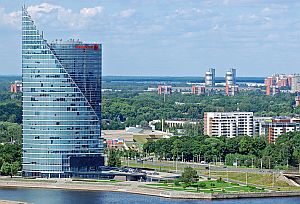Analytics, Baltic, Economics, Financial Services, Inflation, Wages
International Internet Magazine. Baltic States news & analytics
Thursday, 25.04.2024, 01:25
Swedbank's economic growth forecasts for Baltic in 2015 – from 1.9% to 2.3%
 Print version
Print version |
|---|
Back in January, Swedbank experts were predicting that consumer prices in Latvia would on average increase 0.5% this year.
The average consumer price growth is still expected to be moderate, as Swedbank Senior Economist in Latvia Lija Strasuna said while presenting the bank's latest macroeconomic review yesterday.
Swedbank's economic growth forecast for Latvia remains unchanged. Just as in January, the bank still expects Latvia's economy to grow 1.9% this year, accelerating to 3.5% in 2016. Household consumption is believed to be the main driving force behind the economic growth this year.
The economic growth projections for the other Baltic countries are similar to that for Latvia – 2.1% in Estonia and 2.3% in Lithuania.
Nevertheless, economic growth of about 2% is not enough for the Baltic countries to catch up with the wealthier European countries, stressed Strasuna.
Swedbank Chief Economist in Latvia Martins Kazaks said that, regardless of rises and falls, all three Baltic countries' growth pace was fairly good during the past twenty years. But for growth to continue in the future, implementing strategic and structural changes and upgrading the tax system is of paramount importance. "If we do not take well thought out decisions today to support growth in the future, the convergence may stop or become very slow," said Kazaks. A very slow convergence, in turn, means a higher migration risk, he emphasized.
Swedbank raised Estonia's economic growth forecast for this year to 2.1%; in January, the bank forecast 2% growth, Public Broadcasting reports. The bank pointed out as the cause of changing the forecast the stronger-than-expected economic growth in the final quarter of last year and slightly improved prospects for an improvement in external demand.
The economic forecast indicates that the net wage growth, strong consumer confidence and low fuel prices support the growth in domestic demand, but the return of inflation is not expected before the second half of the year.
Postimees Online adds that according to Swedbank chief economist Tõnu Mertsina, economic growth will accelerate in 2016 to 2.8% (the January forecast was 2.7%).
"Although foreign demand will be weaker than last year, we are still a bit more optimistic than in the January forecast," said Mertsina.
The labour market is expected to tighten in 2015-2016; thus wage growth will remain strong.
The working-age population is decreasing, the employment rate is already high, and the unemployment rate will drop further. Employment will increase marginally this year due to the labour registration obligation, which will push up official employment statistics in the first half of the year.
Households’ real purchasing power will grow markedly this year, due to lower labour taxes and zero inflation. A rise in pensions and other social benefits will further support private consumption, which will be the biggest contributor to GDP growth both in 2015 and 2016. Despite the economic crisis in Russia and the constant flow of worrying news from the East, Estonian consumers feel economically secure, and retail sales have remained very strong.
Consumer prices are expected to start climbing higher, on a year-on-year, in the second half of 2015, mostly because of lower energy and food prices during the previous year, but also because higher prices of US dollar-denominated imports will start to kick in. The crude oil price is expected to fluctuate around USD 55-65 per barrel in 2015 and USD 65-75 per barrel in 2016. Next year, inflation will accelerate, as energy and food prices will increase, and another round of excise tax hikes will lift the prices of alcoholic drinks.








 «The Baltic Course» Is Sold and Stays in Business!
«The Baltic Course» Is Sold and Stays in Business!

